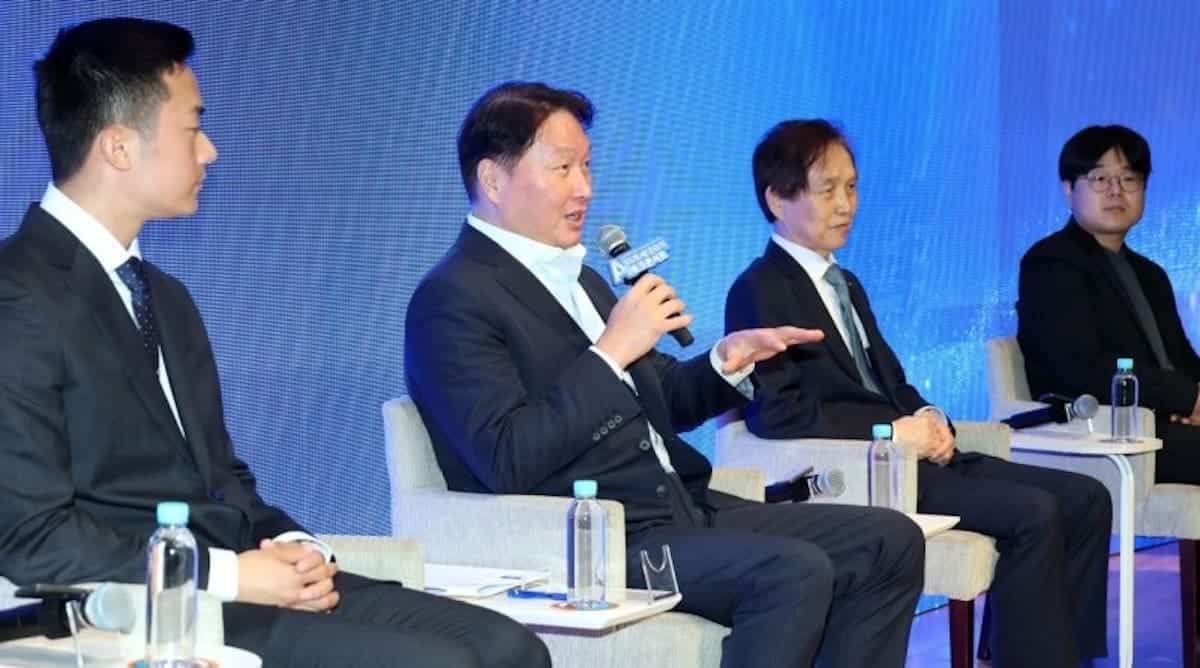The chairman of SK Group warns from South Korea about China’s unstoppable advance in artificial intelligence and manufacturing: “We’re falling behind.”
The South Korean tech sector has received a cold shower. In a speech delivered yesterday during an event at the Korea Advanced Institute of Science and Technology (KAIST), Choi Tae-Won, chairman of SK Group and leader of SK Hynix, issued a grave warning: “At the speed China is going, there’s a serious risk that we won’t be able to catch up and may be wiped out of the market.”
His words, pronounced at a time of financial prosperity for SK Hynix, the world’s second-largest memory manufacturer, resonated like an emergency call within the industry. The Chinese advance in artificial intelligence and manufacturing is seriously concerning the South Korean sector, which fears falling behind in a race where current profits alone are no longer enough; what matters is future adaptability and technological differentiation.
The Threat of the Asian Giant
According to Choi, “China is advancing ahead of Korea not only in artificial intelligence but also in manufacturing.” He added, “Unless we develop a program that gathers manufacturing data, builds appropriate systems, and drastically improves manufacturing competitiveness, we will inevitably fall behind in the race.”
Choi’s words are not just a simple strategic reflection. There are concerning data behind them. Earlier this month, Chinese tech companies reportedly purchased $16 billion worth of H20 GPUs from NVIDIA, anticipating new export restrictions. This is a clear signal of the rapid technological deployment that China is undertaking in its quest to dominate AI and the semiconductor industry.
Tariffs and Technological Limits
Choi also referred to the tariffs promoted by the U.S. administration. While he recognized that these may lead to the relocation of manufacturing plants out of China, he warned that this would not be enough to halt the advance of the Asian country: “Even if Trump raises tariffs and manufacturing plants are relocated to countries other than Korea, without centrally focused technologies, we will not be able to succeed.”
The danger, he asserted, is that “our competitors, who are integrating artificial intelligence into manufacturing, will be the ones building the next generation of factories.” He concluded with a stark but revealing statement about the level of tension at play: “If SK Hynix wants to compete in this global war, we must be willing to sacrifice an arm to dismember our opponent. We are determined to face the challenges and fight to win.”
Differentiation as the Only Way Out
For Choi, the key lies in differentiation. “True competitiveness lies in how differentiated we are,” he insisted. In this regard, he revealed that SK is heavily investing in the purchase of NVIDIA GPUs, which are essential for AI processes, and in the development of chips specifically designed for AI data centers.
“We are going beyond memory to expand memory,” he explained, underscoring his future strategy: to build AI data centers at the lowest possible cost. This vision aligns with the evolution of companies like NVIDIA, which made clear during GTC 2025 that they are no longer just chip manufacturers but also providers of algorithms and comprehensive infrastructure.
The Shadow of a Global Technological War
Choi Tae-Won’s statements come at a crucial moment. While the United States pressures Taiwan and TSMC to bring the most advanced manufacturing processes to American soil, China is strengthening its technological independence with a network of strategically subsidized and coordinated companies to cover the entire value chain.
The Chinese model, focused on creating national champions in every key sector, is gaining ground. And its strategy leaves no room for complacency: if a technology is strategic, a company is created from scratch to dominate it. Divide and conquer, with subsidies as catalysts. A formula that, in light of the results, is putting historical giants like SK Hynix on the ropes.
A Turning Point
Choi’s message is not just a warning for South Korea. It is a call to action that resonates throughout the global tech sector. If even the big players are beginning to see the possibility of being left out of the game, what future awaits smaller or more dependent companies?
With China accelerating in AI, manufacturing, and chips, and with geopolitics redrawing the rules of trade, the technological race has become a battle for survival. And as Choi Tae-Won made clear, in this global war, it’s no longer enough to compete. One must be willing to do whatever it takes to win.

